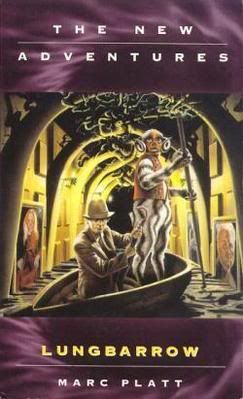
Lungbarrow by Marc Platt
In Brief: The 7th-Doctor's final story (although not quite the final New Adventure). On the Time Lord's home planet of Gallifrey, hidden within the buried House of Lungbarrow, is the answer to the question of "Doctor Who?"
Firstly, Lungbarrow is the bridge between the New Adventures and the 1996 TV-Movie with the novel ending as The Doctor leaves to collect The Master's remains from Skaro (which is a mission given to him by President Romana).
Secondly, Lungbarrow is the novel that fully explains The Doctor's background. It's...complicated
Thirdly, Lungbarrow is insanely continuity-heavy with the reader expected to be familiar with and understand the backgrounds of Romana, Leela, Andred, Dorothee/Ace, 2 versions of K9 and the complete history of Gallifrey.
Fourthly, Lunbarrow started life as a script for the 1989 series on TV before it was decided to take the core idea of a spooky old house and turn it into "Ghost Light".
Fifthly, Lungbarrow isn't actually very good.
15 years later, with the New Adventures a distant memory and the seventh full series of the revived show currently filming all of the revelations of Lungbarrow feel flat. If anything the book proves what a good idea getting rid of Gallifrey and the Time Lords was for Doctor Who in purging the series of much of the unneeded baggage that had accumulated over 30+ years. The problem is that for the most part The Doctor's home planet just isn't very interesting and having him return is rather purposeless. The truth is that Time Lords are boring.
So while many readers may rejoice at "discovering" that The Doctor is actually the reincarnation of a founding-father of Time Lord society known as The Other who passed his genetic code along through the Gallifreyan Looms which birth the adult children of a society struck barren by the curse of the ancient Pythia and that Susan is actually the grand-daughter of The Other who met The Doctor when he illegally traveled into the past of his own planet in a stolen Tardis under the control of the Hand of Omega to me it just seemed a bit silly.
In particular Platt's version of a Time Lord society without children and the "truth" about Susan just seems to be the most extraordinarily complicated way ever devised to keep The Doctor as a character who has never had sex. While I'm at times critical of Steven Moffat I'm glad that he through this all away in having The Doctor admit that he knows how to "dance".
However Lungbarrow isn't terrible, more just a mess (much like the author's early New Adventure Cat's Cradle: Time's Crucible). Platt's writing style is good and he's excellent at devising memorable settings. It's just that despite the massive amounts of references to past stories and surfeit of old characters there's not really much going on. Most of the book has The Doctor and Chris wandering through the musty remains of Lungbarrow dealing with murder-mystery involving The Doctor's family. Meanwhile in the Time Lord Capitol Leela and President Romana must thwart an attempted coup (a plot-thread which sort of disappears by the end of the book). So overall it means that the last full 7th-Doctor story is somewhat underwhelming.
But the biggest problem for Lungbarrow, as stated earlier, is just that it's a dated version of what Doctor Who is meant to be. Even for 1997 this is a throw-back to an earlier time (the continuity-laden 1980s) with old characters and monsters brought back with little reason or care. The strength of the New Adventures is how it added depth and development to the regular characters in Doctor Who, which was mostly lacking in the original show but so very important post-2005. The series had moved beyond these "celebrations" of the past.
However it's still fitting that the secretive and manipulative 7th-Doctor has all of his secrets laid bare at the end of his life. Everything is nicely tied up in preparation for the Paul McGann movie, with Chris electing to stay on Gallifrey as The Doctor heads off to his destiny in 1999 San Francisco. But still, 15 years after publication, Lungbarrow doesn't hold up well. While it's brave with delving into The Doctor's background it suffers from the truth that removing the mystery somewhat lessens the character.
Plus the "truth" isn't actually very interesting, which is all well and good since the malarkey around The Other is never mentioned again which shows how pointless it was.
But still, despite my (surprising) disappointment with the book I'm a little sad that I'm now through all of the New Adventures involving the Sylvester McCoy version of The Doctor. I've enjoyed getting through all of the books again, even the bad ones. It's remarkable how the series really grabbed hold of the possibilities of a book-based version of Doctor Who. What could have just been a rather mediocre series of spin-off novels, such as the Star Trek(s), instead became *the* new version of Doctor Who for most of the 1990s. There's no reason that everything from Timewyrm: Genesys to Lungbarrow isn't an official part of the grand story of Doctor Who, such is the strength of the stories and characters.
The New Adventures is what proved that there was a lot more life in Who after 1989 and for that they need to be celebrated. Now on to the adventures of Doctor #8...
No comments:
Post a Comment